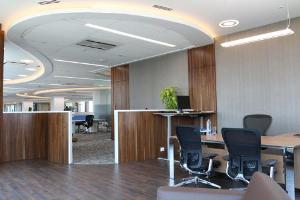Jun 5 2014
Employees in the recently opened Bayer India headquarters need not worry about working in a well-lit room even when burning the midnight oil.
 The LEED-certified Bayer House in Thane, India, features Makrolon(R) Lumen XT polycarbonate sheet in light fixtures and Makrolon(R) AR polycarbonate sheet for security glazing. (PRNewsFoto/Bayer MaterialScience LLC)
The LEED-certified Bayer House in Thane, India, features Makrolon(R) Lumen XT polycarbonate sheet in light fixtures and Makrolon(R) AR polycarbonate sheet for security glazing. (PRNewsFoto/Bayer MaterialScience LLC)
Lighting fixtures made with Makrolon® Lumen XT polycarbonate sheets offer high light diffusion, transmission and optimal clarity, ideal for an office environment. They are based on the most up-to-date forward scattering technology, offering high luminance uniformity and high light output at the same time.
The 50,000-square-foot (15,300 square-meters) Bayer House will bring roughly 800 employees across all Bayer India business subgroups together under one roof. "This building is a reward for an organization that has grown sustainably," said Richard van der Merwe, Senior Country Representative in South Asia. "The office was built foremost to provide a home for a fast-growing business organization, and the impressive and beautiful Bayer headquarters in Thane is a symbol for the strengths of the company as well."
As a LEED (Leadership in Energy and Environmental Design) Gold-certified building, the Bayer House fulfills all stipulations for energy-saving and conservation to make it a sustainable building, including power saving measures, carpet use and even its own sewage treatment plant. In addition to Makrolon® Lumen XT polycarbonate sheet, use of Makrolon® AR2 clear polycarbonate sheet for security glazing also contributed to LEED certification. This grade offers high abrasion resistance, surface hardness, impact resistance, strength and clarity.
The floor plan follows an open office concept to facilitate better interaction and transparency within the organization. The building also includes an employee cafeteria, a lounge and a roof-top garden area, where vegetables will be grown from seeds offered by Bayer CropScience.
At the beginning of 2011, Bayer opened its first emissions-neutral office building in India, which later received the top – Platinum – ranking in the LEED rating system. The zero-energy building needs approximately 50 percent less power than comparable buildings in the region. Both projects provide strong evidence of Bayer's commitment to energy-efficient construction and show that sustainability can also work very well in emerging countries.